Solat. | Recitations. | Supplications. | Sunnah.
Solat Recitation Guide
A Comprehensive Guide to Recitations in Islamic Solat
Unlock the doors to spiritual communication with 'Solat Recitation Guide,' your definitive guide to the recitations within Solat. Traverse through each word and gesture, exploring their profound meanings and the tranquil path they pave in connecting with Allah SWT.
Embracing Solat, in its obligatory (fardh) or voluntary (Sunnah) forms, is a journey into a heartfelt dialogue with Allah SWT. 'Islamic Solat Recitation: A Melodic Communion' illuminates every recitation, providing not only their profound meanings and origins rooted in revered Hadiths but also offering a valuable auditory guide.
With audio playbacks aimed particularly at those keen on enhancing their tajweed, especially newcomers to Islam, this guide ensures that each word is not only understood but also pronounced correctly. Crafted to deepen your understanding and practice, this guide supports every believer in fostering a more meaningful and linguistically accurate connection with the Divine through informed and articulated worship.
Let's Begin!
For an optimal listening experience, we recommend using headphones when playing the audio. For better viewing on a browser, set your screen size to 85% or switch to landscape mode. These recordings will soon be available in the course section and on our learning app. InshaAllah! Stay Tuned!
#1
RECITE AL-FATIHAH
بِسْمِ اللَّهِ الرَّحْمَنِ الرَّحِيمِ الْحَمْدُ لِلَّهِ رَبِّ الْعَالَمِينَ الرَّحْمَنِ الرَّحِيمِ مَالِكِ يَوْمِ الدِّينِ إِيَّاكَ نَعْبُدُ وَإِيَّاكَ نَسْتَعِينُ اهْدِنَا الصِّرَاطَ الْمُسْتَقِيمَ صِرَاطَ الَّذِينَ أَنْعَمْتَ عَلَيْهِمْ غَيْرِ الْمَغْضُوبِ عَلَيْهِمْ وَلَا الضَّالِّينَ
The Prophet (ﷺ) said, "Whoever performs any prayer and does not recite Umm Al-Qur'an (i.e., Al-Fatihah) in it, his prayer is incomplete."
- Alhamdu lillahi Rabbil 'alameen.
- Ar-Rahmanir Rahim.
- Maliki yawmid-deen.
- Iyyaka na'budu wa iyyaka nasta'een.
- Ihdinas-siratal-mustaqeem.
- Siratal-lazeena an'amta 'alaihim ghairil-maghdoobi 'alaihim wa lad-dalleen.
In the name of Allah, the Entirely Merciful, the Especially Merciful.
- [All] praise is [due] to Allah, Lord of the worlds -
- The Entirely Merciful, the Especially Merciful,
- Sovereign of the Day of Recompense.
- You alone we worship, and You alone we ask for help.
- Guide us to the straight path -
- The path of those upon whom You have bestowed favor, not of those who have evoked [Your] anger or of those who are astray.
#2
Recite OTHER SURAH
As for the surah to be recited following Surah Al-Fatihah during the
first two raka'ah of the prayer, you may choose any surah from the Qur'an. For
convenience, especially during shorter prayers or for those who are in the
initial stages of memorizing the Qur'an, here are some shorter surahs that you
may consider reciting
In the first and second raka;ah, after recitation of Surah al-Fatihah in Qiyam (standing position).
Surah Al-Ikhlas
بِسْمِ اللَّهِ الرَّحْمَنِ الرَّحِيمِ
قُلْ هُوَ اللَّهُ أَحَدٌ
اللَّهُ الصَّمَدُ
لَمْ يَلِدْ وَلَمْ يُولَدْ
وَلَمْ يَكُن لَّهُ كُفُوًا أَحَدٌۢ
- Qul huwa Allahu ahad
- Allahu assamad
- Lam yalid walam yoolad
- Walam yakun lahu kufuwan ahad
- Say, "He is Allah, [who is] One,
- Allah, the Eternal Refuge.
- He neither begets nor is born,
- Nor is there to Him any equivalent."
Reciting Surah al-Ikhlas is equal to 1/3 of the Qur’an
Narrated by Abu Sa’id Al-Khudri R.A
The Prophet (ﷺ) said to his companions, "Is it difficult for any of you to recite one third of the Qur'an in one night?" This suggestion was difficult for them so they said, "Who among us has the power to do so, O Allah's Messenger (ﷺ)?" Allah Apostle replied: "Allah (the) One, the Self-Sufficient Master Whom all creatures need.' (Surah Al-Ikhlas 112.1--to the End) is equal to one third of the Qur'an."
SURAH AL-FALaQ
بِسْمِ اللَّهِ الرَّحْمَنِ الرَّحِيمِ
قُلْ أَعُوذُ بِرَبِّ الْفَلَقِ
مِن شَرِّ مَا خَلَقَ
وَمِن شَرِّ غَاسِقٍ إِذَا وَقَبَ
وَمِن شَرِّ النَّفَّاثَاتِ فِي الْعُقَدِ
وَمِن شَرِّ حَاسِدٍ إِذَا حَسَدَ
- Qul a'udhu birabbi al-falaq
- Min sharri ma khalaq
- Wa min sharri ghasiqin idha waqab
- Wa min sharri annaffathati fil 'uqad
- Wa min sharri hasidin idha hasad
- Say, "I seek refuge in the Lord of daybreak
- From the evil of that which He created
- And from the evil of darkness when it settles
- And from the evil of the blowers in knots
- And from the evil of an envier when he envies."
Surah An-Nas
بِسْمِ اللَّهِ الرَّحْمَنِ الرَّحِيمِ
قُلْ أَعُوذُ بِرَبِّ النَّاسِ
مَلِكِ النَّاسِ
إِلَٰهِ النَّاسِ
مِن شَرِّ الْوَسْوَاسِ الْخَنَّاسِ
الَّذِي يُوَسْوِسُ فِي صُدُورِ النَّاسِ
مِنَ الْجِنَّةِ وَالنَّاسِ
- Qul a'udhu birabbi annas
- Maliki annas
- Ilahi annas
- Min sharri alwaswasi alkhannas
- Alladhee yuwaswisu fee sudoori annas
- Mina aljinnati wannas
- Say, "I seek refuge in the Lord of mankind,
- The Sovereign of mankind.
- The God of mankind,
- From the evil of the retreating whisperer -
- Who whispers [evil] into the breasts of mankind -
- From among the jinn and mankind."
AYATUL QURSI
اللَّهُ لَا إِلَٰهَ إِلَّا هُوَ الْحَيُّ الْقَيُّومُ ۚ لَا تَأْخُذُهُ سِنَةٌ وَلَا نَوْمٌ ۚ لَّهُ مَا فِي السَّمَاوَاتِ وَمَا فِي الْأَرْضِ ۗ مَن ذَا الَّذِي يَشْفَعُ عِندَهُ إِلَّا بِإِذْنِهِ ۚ يَعْلَمُ مَا بَيْنَ أَيْدِيهِمْ وَمَا خَلْفَهُمْ ۖ وَلَا يُحِيطُونَ بِشَيْءٍ مِّنْ عِلْمِهِ إِلَّا بِمَا شَاءَ ۚ وَسِعَ كُرْسِيُّهُ السَّمَاوَاتِ وَالْأَرْضَ ۖ وَلَا يَئُودُهُ حِفْظُهُمَا ۚ وَهُوَ الْعَلِيُّ الْعَظِيمُ
Allahu la ilaha illa Huwa, Al-Haiyul-Qayyum. La ta'khudhuhu sinatun wa la nawm, lahu ma fis-samawati wa ma fil-'ard. Man dhalladhi yashfa'u 'indahu illa bi-idhnihi. Ya'lamu ma baina aidihim wa ma khalfahum, wa la yuhituna bishai'im-min 'ilmihi illa bima sha'a. Wasi'a kursiyyuhus-samawati wal ard, wa la ya'uduhu hifdhuhuma, wa Huwal-Aliyyul-Adheem
Allah - there is no deity except Him, the Ever-Living, the Sustainer of existence. Neither drowsiness overtakes Him nor sleep. To Him belongs whatever is in the heavens and whatever is on the earth. Who is it that can intercede with Him except by His permission? He knows what is before them and what will be after them, and they encompass not a thing of His knowledge except for what He wills. His Kursi extends over the heavens and the earth, and their preservation tires Him not. And He is the Most High, the Most Great.
The Prophet (ﷺ) said, “Whoever recites the verse of the Throne (Ayatul Kursi) after every prescribed prayer, there will be nothing standing between him and his entering Paradise except death.”
#3
RecitATION IN ruku
سُبْحَانَ رَبِّيَ الْعَظِيمِ
(Recite x3)
The Prophet (ﷺ) said, “When you prostrate, then say 'Subhana Rabbiyal A’la' (Glory is to my Lord, the Most High), and when you bow, say 'Subhana Rabbiyal Adhim' (Glory is to my Lord, the Most Great).”

This phrase is recited while in the position of Ruku (bowing position)
during the Solat.
#4
RecitATION IN I'tidal
سَمِعَ اللهُ لِمَنْ حَمِدَهُ
رَبَّنَا لَكَ الْحَمْدُ
The Prophet (ﷺ) said, "When the Imam says, 'Sami`a l-lahu liman hamidah', you should say, 'Allahumma Rabbana wa laka l-hamd.' And if the saying of any one of you coincides with that of the angels, all his past sins will be forgiven."
Sahih Bukhari 781
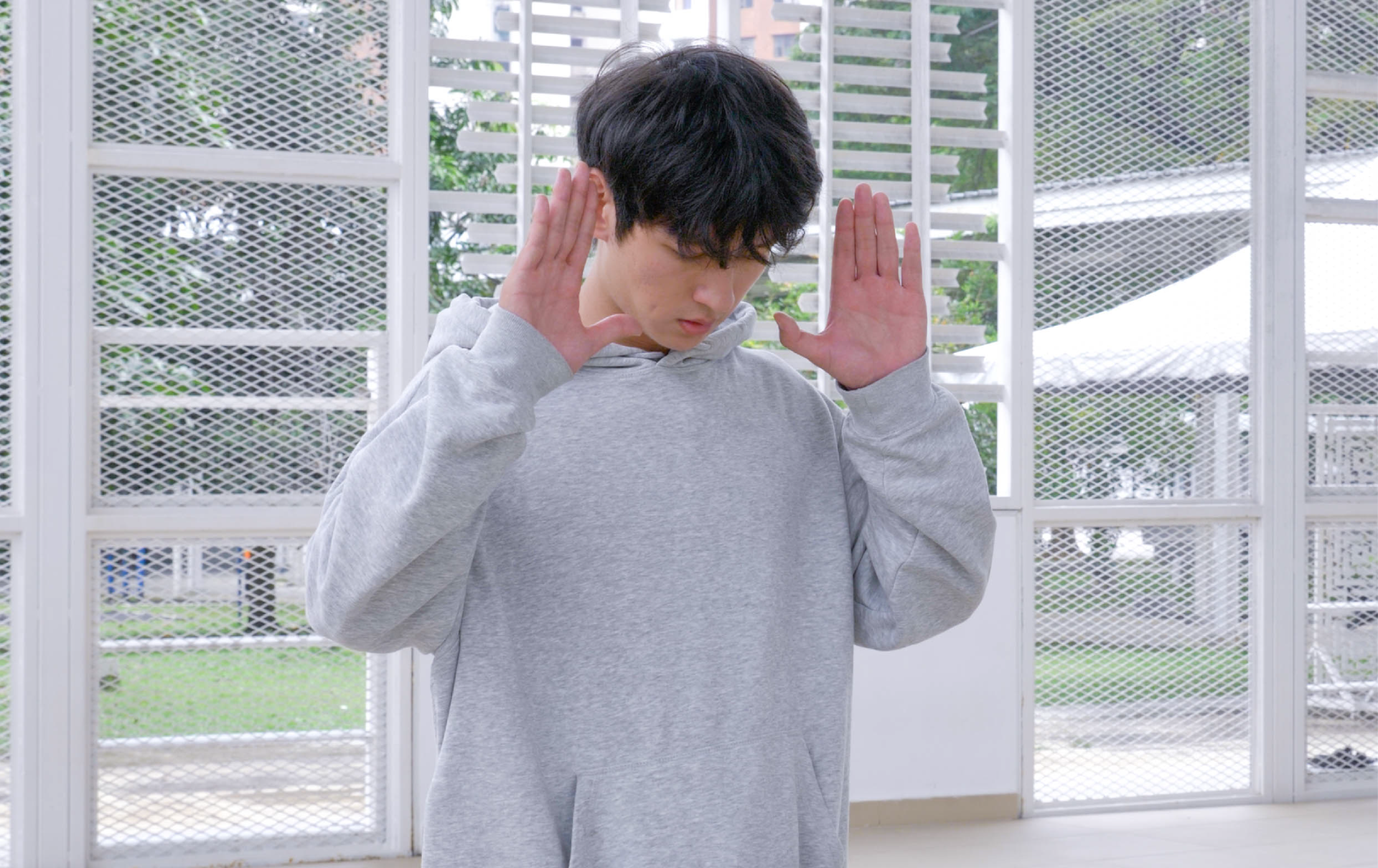
During I'tidal, from rising from bowing position to standing straight, before Sujood
#5
RecitATION IN SUJOOD
سُبْحَانَ رَبِّيَ الأَعْلَى
(Recite x3)
The Prophet (ﷺ) said, “When you prostrate, then say 'Subhana Rabbiyal A’la' (Glory is to my Lord, the Most High), and when you bow, say 'Subhana Rabbiyal Adhim' (Glory is to my Lord, the Most Great)."
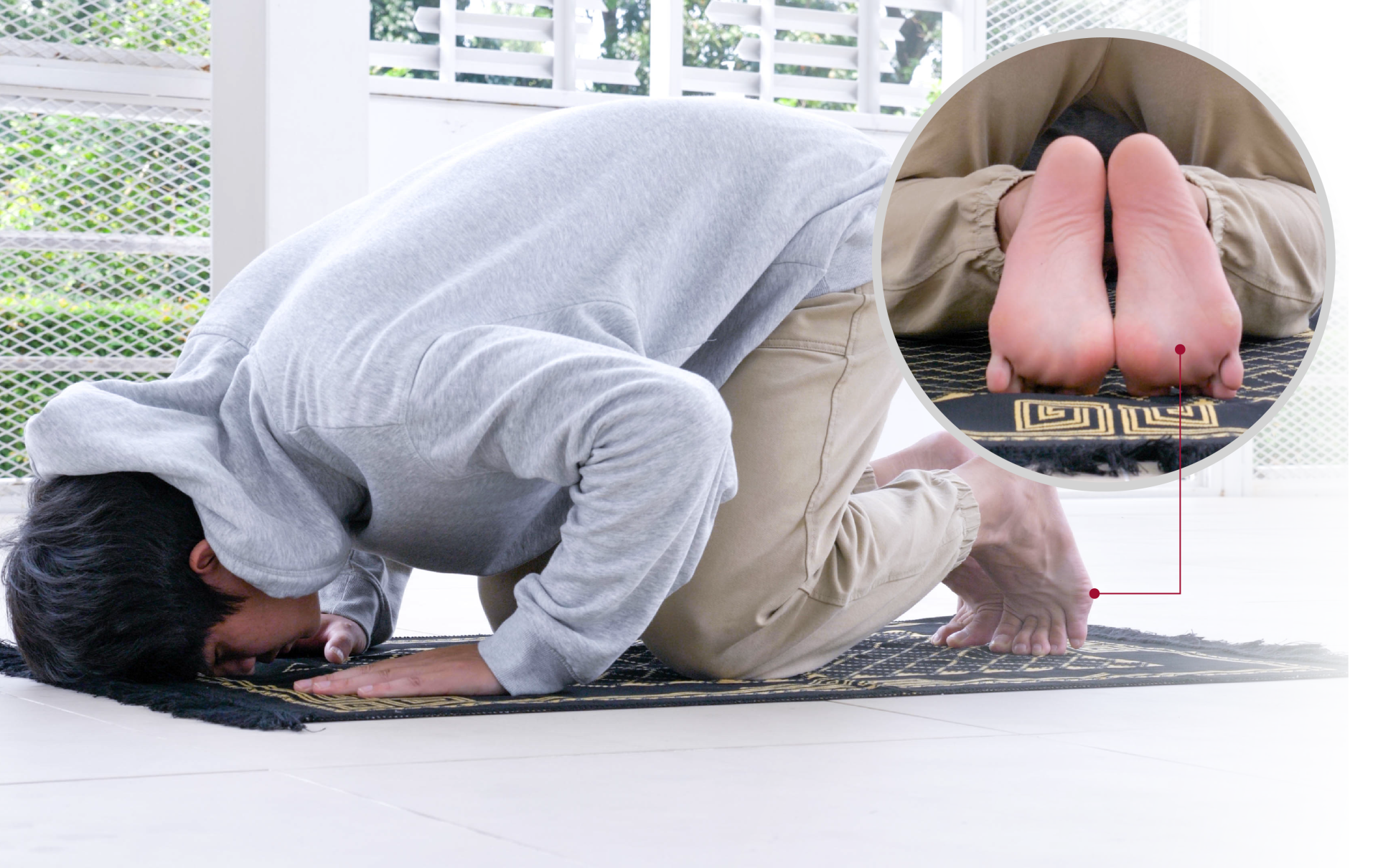
#6
RecitATION IN QOD'DAH
رَبِّ اغْفِرْ لِي وَارْحَمْنِي وَاجْبُرْنِي وَارْفَعْنِي وَارْزُقْنِي وَاهْدِنِي وَعَافِنِي
رَبِّ اغْفِرْ لِي
Recite (x3)
The Prophet (ﷺ) used to say between the two prostrations: “Rabbigh-fir lee, Rabbigh-fir lee (My Lord forgive me, My Lord forgive me).”
have mercy upon me, guide me, enrich me, give me health, grant me sustenance and raise my rank.
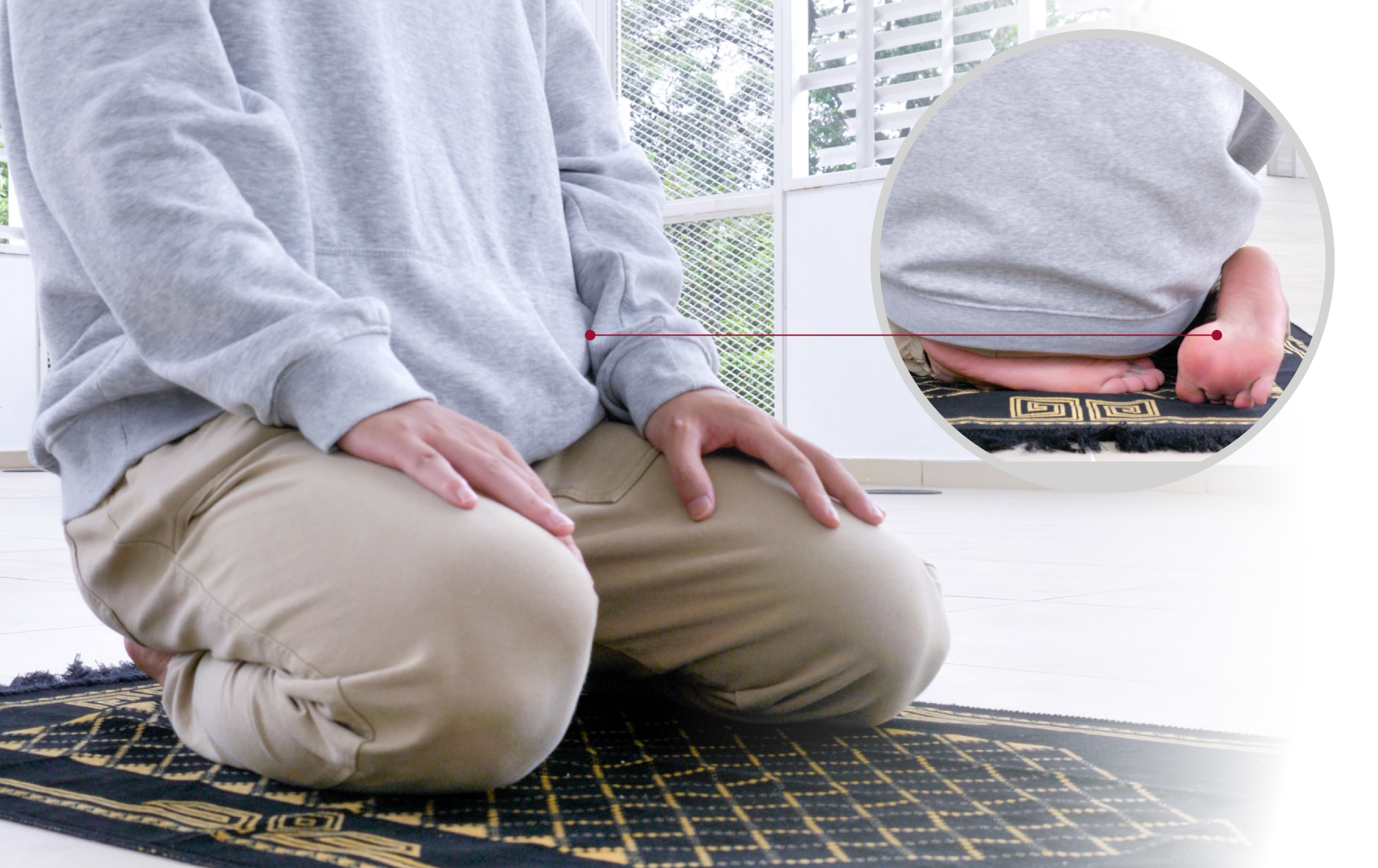
#7
RecitATION OF ATTAHIYAT
اَلتَّحِيَّاتُ الْمُبَارَكَاتُ الصَّلَوَاتُ الطَّيِّبَاتُ ِللهِ، السَّلاَمُ عَلَيْكَ اَيُّهَا النَّبِيُّ وَرَحْمَةُ اللهِ وَبَرَكَاتُهُ، السَّلاَمُ عَلَيْنَا وَعَلَى عِبَادِاللهِ الصَّالِحِيْنَ، أَشْهَدُ اَنْ لآ إِلَهَ إِلاَّاللهُ وَاَشْهَدُ أَنَّ مُحَمَّدًارَسُوْلُ اللهُ
كَمَا صَلَّيْتَ عَلَى إِبْرَاهِيمَ وَعَلَى آلِ إِبْرَاهِيمَ وَبَارِكْ عَلَى مُحَمَّدٍ وَعَلَى آلِ مُحَمَّدٍ
كَمَا بَارَكْتَ عَلَى إِبْرَاهِيمَ وَعَلَى آلِ إِبْرَاهِيمَ
فِي الْعَالَمِينَ إِنَّكَ حَمِيدٌ مَجِيدٌ۔
"Only Um Hani told us that she saw the Prophet (ﷺ) offering the Duha (forenoon prayer). She said, 'On the day of the conquest of Mecca, the Prophet took a bath in my house and offered eight Rakat. I never saw him praying such a light prayer but he performed perfect prostration and bowing.' Regarding the Tashahhud, I never heard him saying greater in it than these words: 'At-Tahiyatu Lillah, Az-Zakiyat Lillah, At-Taiyibatu, As-Salawatu Lillah. As-Salamu 'Alaika ayyuhan-Nabiyyu wa Rahmatullahi wa Barakatuhu! As-Salamu Alaina wa ala ibadil-lahis-salihin. Ashhadu an la ilaha illallah wa ashhadu anna Muhammadan 'Abduhu wa Rasuluhu. (All the compliments are for Allah: All the physical prayers and worship are for Allah: All the pure sincere blessings are for Allah. Peace be on you, O Prophet and Allah's mercy and blessings (be on you)! And peace be on us and on the pious slaves of Allah, I testify that none has the right to be worshipped but Allah, and I testify that Muhammad is His slave and His Apostle.)'"
The Prophet (ﷺ) as saying: "He who blesses me once, Allah would bless him ten times."
At-tahiyyatu al-mubarakatu as-salawatu at-tayyibatu lillah
as-salamu ‘alayka ayyuha’n-Nabiyyu wa rahmat-Allahi wa barakatuhu.
As-salamu ‘alayna wa ‘alaa ‘ibad-Illah is-saliheen.
Asyahadu alla illaha illallah.
Wa asyhadu anna Muhammadar Rasulullah
All
the best compliments and the prayers and the good things are for Allah.
Peace
and Allah’s Mercy and Blessings be on you, O Prophet!
Peace
be on us and on the pious slaves of Allah, I testify that none has the right to
be worshipped but Allah, and I also testify that Muhammad is Allah’s slave and
His Apostle.
Kama sallaita ‘ala Ibrahima wa ‘ala ali Ibrahima wa barik ‘ala Muhammad wa ‘ala ali Muhammad Kama barakta ‘ ala Ibrahima Wa ‘ ala ali Ibrahima
Fil a’lamina Innaka hamidun Majid.”
O Allah, let Your mercy come upon Muhammad and the family of Muhammad as
You let it come upon Ibrahim and the family of Ibrahim O Allah, bless Muhammad
and the family of Muhammad as You blessed Ibrahim and the family of Ibrahim.
Truly You are Praiseworthy and Glorious.
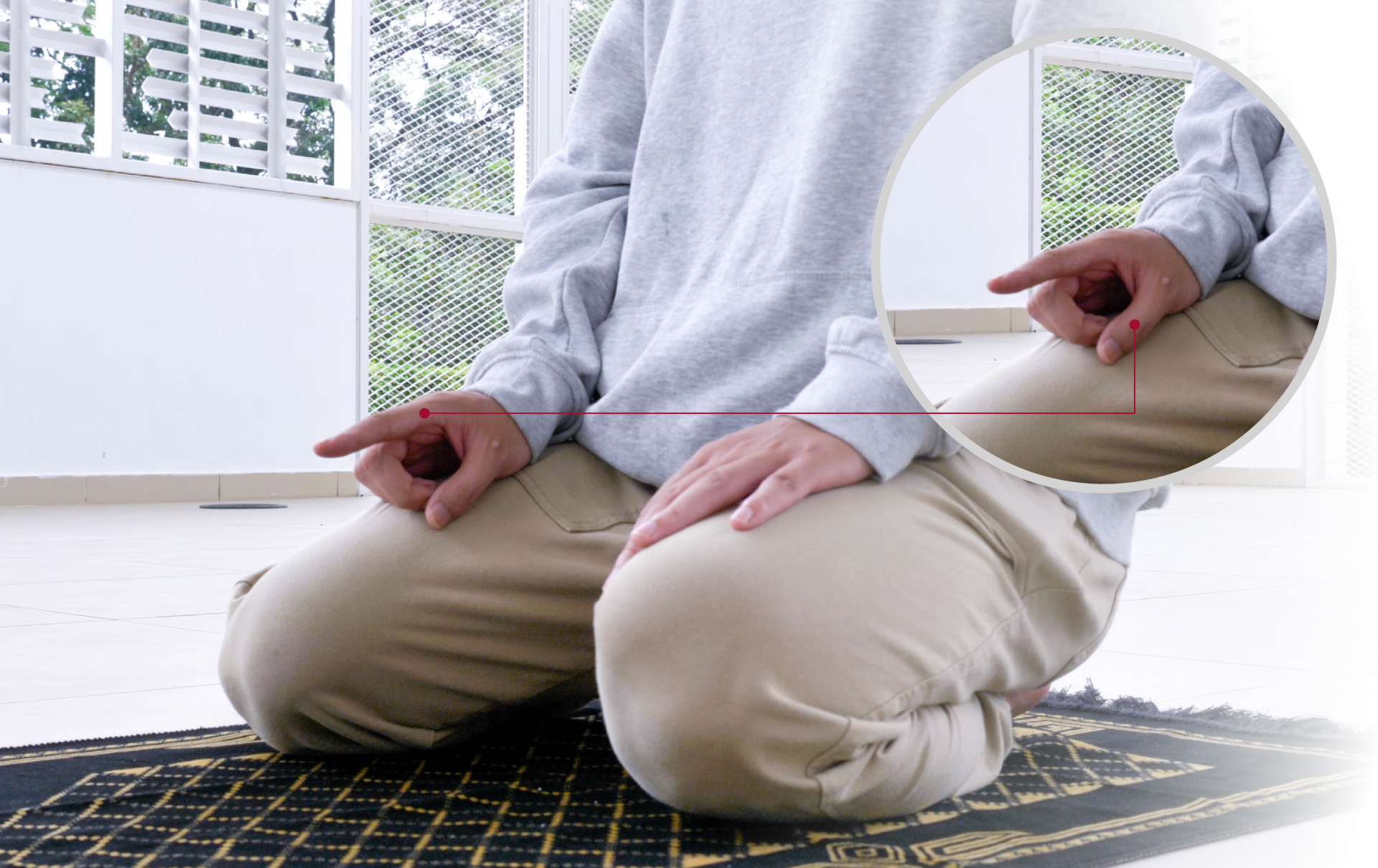
Attahiyat, also referred to as Tashahhud, is recited while seated during solat in the iftirash position. If the solat consists of more than two raka’ahs (units of prayer), the first part of Attahiyat is recited in the sitting position during the second raka’ah.
In the final raka’ah (in the tawarruk seating position), the full version of Attahiyat (combining both the first and second parts, the Salawat/Ibrahimiyya) is recited.
For solat that comprise only two raka’ahs, the full version of Attahiyat is recited in the sitting position of the second raka’ah (in the tawarruk seating position, before offering salam)
#8
conclude with salam
السَّلَامُ عَلَيْكُمْ وَرَحْمَةُ اللَّهِ
"When the Prophet (ﷺ) made the salutation (to end the prayer), he said: 'As-salamu ‘alaykum wa rahmatullah' twice, and he used to turn his face to the right side."
“Verily, there are two angels sent upon you both, on the left and the right. They guard you through the command of Allah. Do not cause them to be distracted from you, for indeed, they are noble and virtuous. They write down your deeds and they do not become heedless until you become heedless.”
Shu’ab al-Imān" by Al-Bayhaqi, number 415
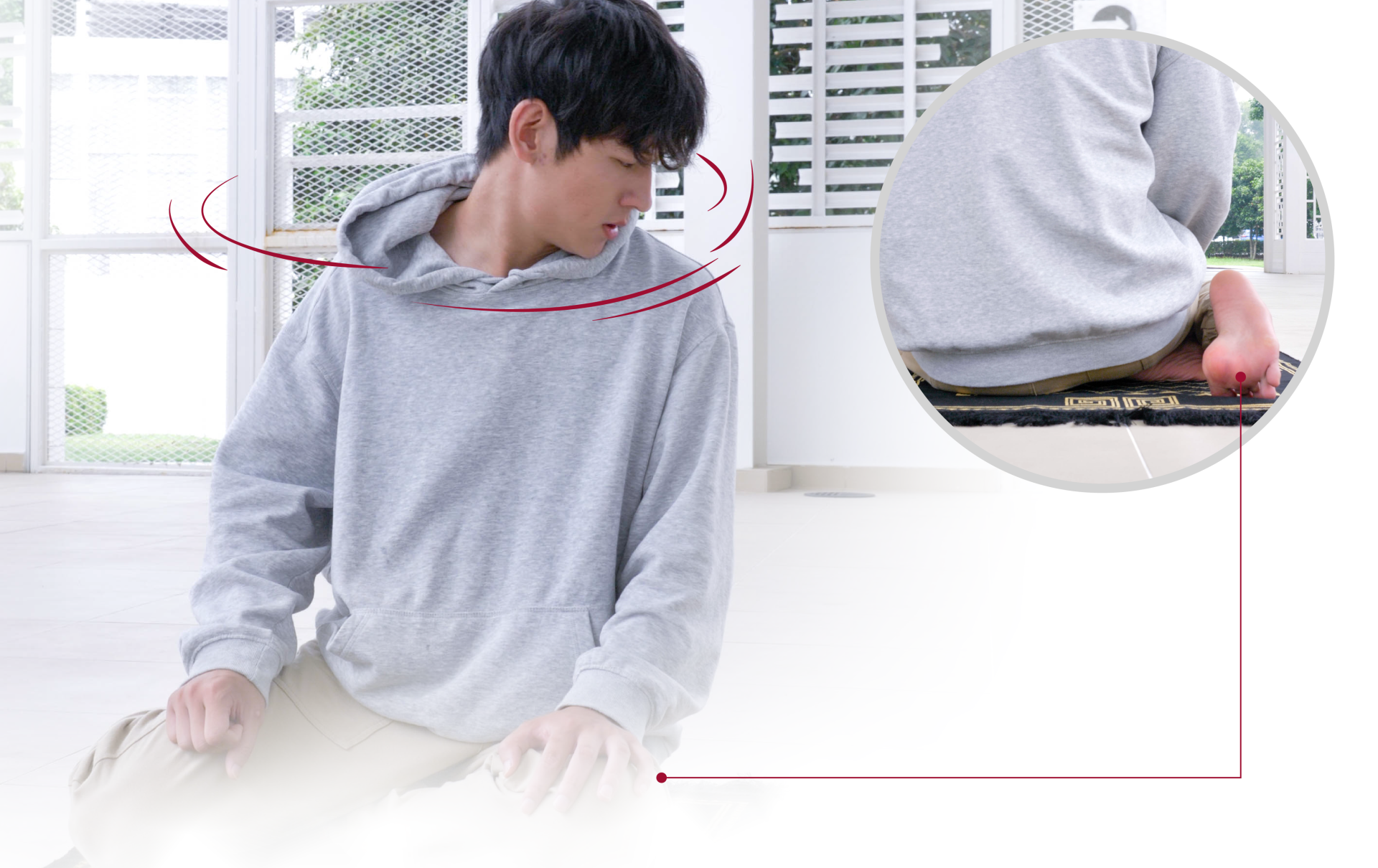
Upon concluding the solat in the Tawarruk position, after the full recitation of Attahiyat.
The Underlying Merits of Timely & Congregational Prayers in Hadiths
The following Hadiths underscore the profound merits and significance of praying (Solat) promptly, without delay, at its stipulated time and participating in congregational prayers.
Narrated Abdullah bin Mas’ud R.A
When asked, 'Which deed is most loved by Allah SWT?' The Prophet (ﷺ) said
answered, 'Prayer at its time.' Followed by 'Kindness to parents' and 'Jihad in
the way of Allah SWT' when asked what comes next.
"Praying in congregation is better than praying alone by
twenty-seven ranks."
"When asked about dealing with those who delay prayers, the Prophet (ﷺ) advised, 'Perform the prayer in its time, then go attend to your need. If congregational prayer is established while you are in the mosque, then pray with them.'"
"Perhaps you will meet groups of people who perform prayers out of its time; if this happens, you should perform the prayer in its time, and pray again with them, making the second prayer a voluntary prayer for you."
Sunan al-Nasa’ie (779)
Pursuant to the advice from the Mufti of Wilayah Persekutuan (Reference:
Al-Kafi #1512) and many Islamic Scholars, it's imperative to understand that
timeliness in prayers and involvement in congregational prayers are profoundly
emphasized in Islamic teachings.
The optimal approach, as suggested, would be
to meld the virtue of praying at the initial time with engaging in
congregational prayers, thus adhering to the spiritual and communal core of the
Islamic faith.
AVOID THESE DURING YOUR SOLAT

BREAK WUDU

IMPURE CONTACT

ABANDONING INTENTION

UNCOVERING 'AWRAH

PASSING INTERRUPTION

IGNORING QIBLA

SPEAKING & LAUGHING

EATING/DRINKING
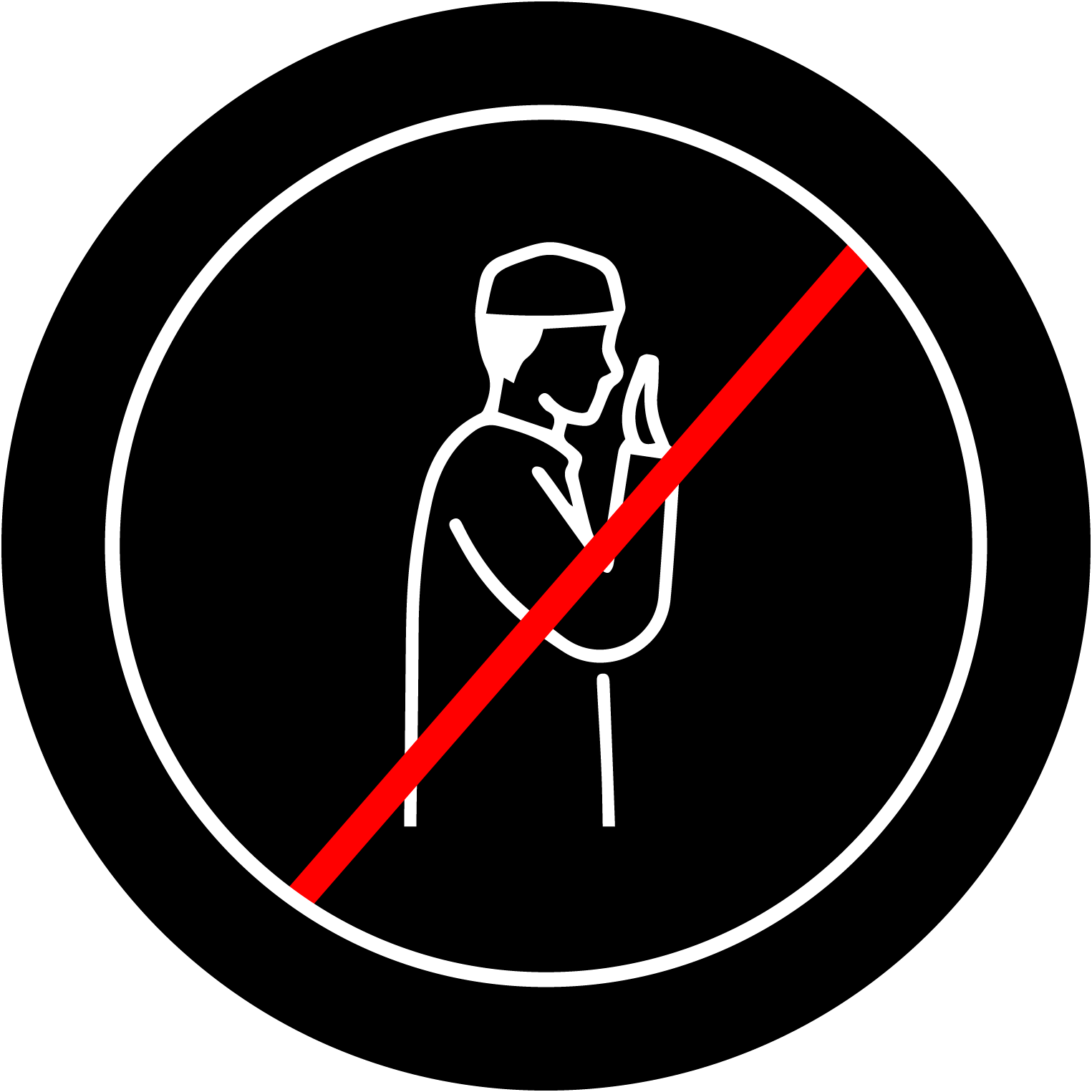
MISSING ESSENTIALS

PILLAR ERRORS
Downloadable E-Books
CONCLUSION
Prophet Muhammad (ﷺ) tenderly instructed us: "Pray as you have seen me praying" embedding a powerful essence of devotion and continual spiritual aspiration within our daily Salah. Our prayers are not merely ritualistic obligations but a serene journey where our soul seeks and attains proximity to Allah (SWT).
Through verses like Ayatul Kursi and Surah Al-Ikhlas, we find not only protective shields in our earthly lives but also nurture our inner tranquility and spiritual connection with the Divine. These recitations are our humble offerings and a testament to our unwavering submission to Him.
In the pursuit of spiritual refinement and divine knowledge, may our hearts remain submissive, and our tongues perpetually engaged in His remembrance.
"Indeed, the prayer is a shield against immorality and wrongdoing, and the remembrance of Allah is greater." (Qur'an 29:45)
May our endeavors in worship pave our way toward eternal peace and divine proximity, and Allah knows best.
This article is intended to serve as a
general guide and informational resource regarding solat recitations and is not
a substitute for religious advice from a qualified scholar. While every effort
has been made to ensure the accuracy and completeness of the information
presented, various viewpoints and interpretations of Islamic teachings may be
portrayed. Readers are urged to engage in additional research and/or consult a
qualified Islamic scholar for any specific inquiries or deeper understanding.
In matters of faith, worship, and specific and detailed religious matters, consulting with knowledgeable scholars or religious authorities is always recommended. Do cross-verify this with your local religious authority. Should you find any errors or discrepancies in the content, please do not hesitate to contact us, allowing us to rectify them promptly. Our ultimate goal is to provide a helpful, accurate, and informative resource for those seeking guidance on matters of faith and worship.
Pages
-
Home
-
Courses
-
About Us
-
Corporate
-
New Muslim Guide
-
Mandarin Chinese Series
-
Dawah Blog
-
Announcement
-
Contact Us
Policy Pages
Encountering Technical Hiccups?
Our digital mechanics are fine-tuning some gears on our platform, and you might navigate through a few bumps on this page particularly involving:.
🎵 Challenges with audio playback or visibility



